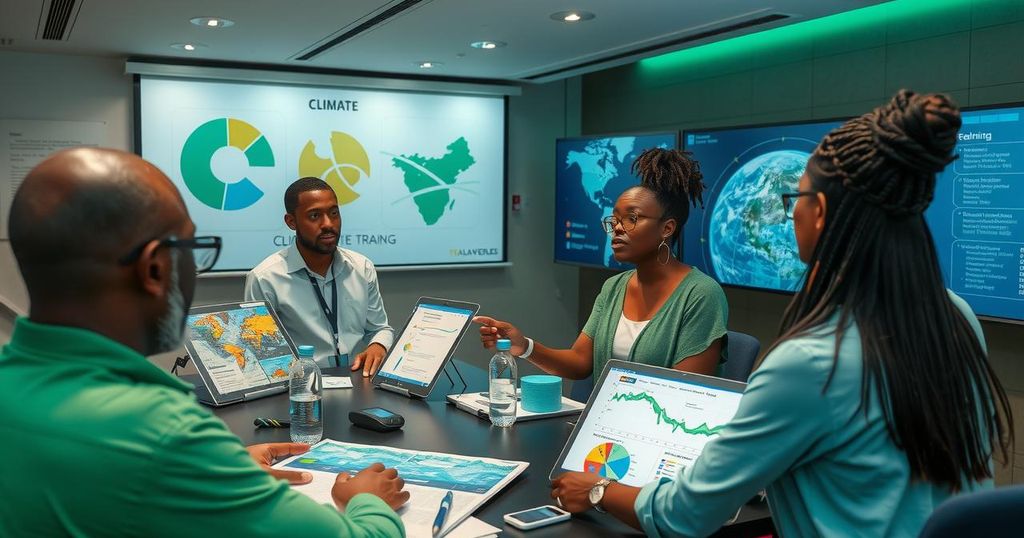COP29, scheduled for November 2024 in Azerbaijan, must prioritize holding major corporations and nations accountable for greenhouse gas emissions through the enforcement of the ‘polluter pays’ principle. This long-accepted concept urges polluters to bear the costs of their emissions but has not been effectively enforced. The article highlights previous COPs’ shortcomings, calls for specific measures to ensure accountability, and emphasizes the necessity for global solidarity in tackling climate change impacts on vulnerable communities, particularly in developing nations.
The 29th Conference of the Parties (COP29), scheduled for November 2024 in Azerbaijan, must prioritize accountability for corporations and nations concerning their greenhouse gas emissions. The widely endorsed ‘polluter pays’ principle posits that those responsible for pollution ought to bear the costs associated with managing their emissions, thereby safeguarding human health and the environment. Despite its theoretical acceptance, practical implementation remains inconsistent, with leading polluters often avoiding financial repercussions. Developing nations, disproportionately affected by climate change, continue to shoulder the costs of adaptation and mitigation efforts despite contributing minimally to global emissions. Amidst escalating climate challenges and an alarming increase in global temperatures—recently surpassing 2°C above pre-industrial levels—the urgency for substantive action at COP29 has never been more pressing. Failure to curb emissions could lead to catastrophic economic and health consequences, particularly in vulnerable regions like Africa. As an environmental science professor with insights into fossil fuel pollution’s impacts, I assert that COP29 presents a pivotal opportunity to establish mechanisms for holding polluters liable for their emissions. This could include imposing taxes on emissions, mandating compensation for past pollution, and enabling courts to adjudicate climate-related damages. The COP29 dialogue must aim for enforceable sanctions against major emitters who fail to meet their reduction obligations. The history of previous COPs suggests a gap between ambitious climate goals and actionable outcomes. Despite the introduction of the Paris Agreement at COP21, with nations committing to limit global warming to below 2°C, enforcement remains weak, with countries allowed to set voluntary targets with no penalties for non-compliance. A salient example can be seen in the United States’ withdrawal from the Paris Agreement in 2017 without facing any repercussions. To enhance the effectiveness of the ‘polluter pays’ principle, COP29 should consider several enforceable measures: 1. Ending Fossil Fuel Subsidies: The significant subsidies awarded to fossil fuel companies—amounting to $7 trillion globally in 2022—must be discontinued to discourage emissions. 2. Mandatory Climate Finance Mechanisms: Establishing a global climate liability framework would require corporations responsible for emissions to compensate affected regions, analogous to existing liability schemes for environmental catastrophes. 3. Carbon Pricing and Taxation: Implementing a carbon pricing mechanism would assign a cost to emissions based on their societal impacts, thus incentivizing the adoption of sustainable technologies. Successful implementations, such as Sweden’s carbon tax, demonstrate the potential for reduced emissions. 4. Legal Accountability for Damages: COP29 should empower judicial bodies to adjudicate climate responsibility and damages, establishing new legal frameworks to facilitate climate-related lawsuits against high-emission entities. 5. Financial Transparency Regulations: Increased disclosure requirements for companies would enhance accountability, allowing for the identification and sanctioning of major polluters. 6. Accountability for Historical Emissions: Fossil fuel companies should be compelled to contribute to a formal climate reparations fund to address past emissions. COP29 represents a crucial juncture for international climate policy. The establishment of robust accountability mechanisms for major greenhouse gas emitters is imperative. Financial contributions from high-emission nations and corporations are necessary to fund adaptation and mitigation efforts in vulnerable communities. The success of COP29 will hinge on the collective commitment of governments and corporations to principles of justice and equity, ensuring that the burden of climate action is fairly shared, particularly so that countries in Africa—fewest responsible yet most affected—are not bearers of this burden alone.
The article discusses the upcoming COP29, the significance of the ‘polluter pays’ principle in climate policy, and the profound implications of climate change on vulnerable nations. It emphasizes the historical ineffectiveness of prior COP meetings in enforcing emissions reductions and maintaining accountability among large polluters. Given the urgent context of rising global temperatures and the predicted catastrophic impacts of climate change, it advocates for the implementation of strict measures to hold polluters accountable and ensure that the financial burdens of climate adaptation and mitigation do not disproportionately fall on less responsible countries, particularly in the developing world.
COP29 must act decisively to enforce accountability among major greenhouse gas emitters, implement the ‘polluter pays’ principle effectively, and introduce robust sanctions for non-compliance. The proposed measures, including ending fossil fuel subsidies, mandating climate finance mechanisms, and enhancing legal accountability, are critical to achieving climate justice. It is essential for the global community to unify in a commitment to equitable climate policies, ensuring vulnerable populations are not unduly impacted by climate change responsibilities. The success of COP29 will depend on such collective action and adherence to principles of justice and transparency.
Original Source: theconversation.com




